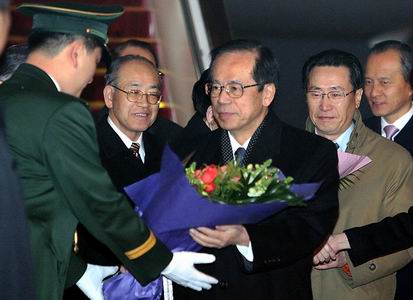
Japanese Prime Minister Yasuo Fukuda (center) arrives in
Beijing yesterday for a four-day state visit to China. Fukuda is slated to hold
talks with Chinese President Hu Jintao and Premier Wen Jiabao
today.°™Xinhua
Japanese Prime Minister Yasuo Fukuda arrived in Beijing yesterday afternoon
for the start of an official visit, which runs until Dec. 30.
On Friday, Chinese leaders Hu Jintao and Wu Bangguo will meet with him, and
Chinese Premier Wen Jiabao will hold talks with him, a key part of his four-day
visit, which has been widely portrayed as a trip to warm up ties.
Before heading to China, Fukuda told Xinhua and other Chinese media in his
Tokyo office that he was "glad" to visit China and would discuss with Chinese
leaders the building of strategic, mutually beneficial relations.
"I expect to further promote the development of Japan-China ties so that next
year, bilateral ties can develop even faster and move to a new stage," he said.
Chinese Foreign Ministry spokesman Qin Gang described Fukuda's visit as
"important", saying that it would have great significance in improving
China-Japan relations.
China hoped that his visit would promote mutual trust in politics and boost
bilateral cooperation in various fields, and thus help maintain and develop
warming ties, Qin told a regular press conference on Thursday.
A report by Kyodo News said that Fukuda would also raise the topics of
resources development in the East China Sea and possible cooperation in
environmental issues, referring to a proposal to set up a Japan-China fund aimed
at helping China's efforts to tackle environmental problems.
Addressing the East China Sea issue, Qin said that China and Japan did have
differences but "China was willing to resolve the issue appropriately as soon as
possible, based on the consensus reached by leaders of the two countries and the
principle of putting aside disputes and seeking joint exploration."
China hoped that the two sides would take a "substantive" step forward in
joint resources development in the East China Sea, Qin said.
During Fukuda's visit, he will also deliver a speech at the prestigious
Peking University, visit a primary school in Beijing, and tour Tianjin, a city
neighboring Beijing, as well as Qufu in Shandong Province, the hometown of
Confucius.
In Tianjin, Fukuda will inspect the Binhai new area, an economic development
zone consisting of more than 6,300 companies, including over 70 joint ventures
among the world's top 500 companies.
"Tianjin, home to many Japanese-funded companies, is an important city in
north China and its development has been listed as a key goal in China's 11th
Five-Year Plan," said Qin Gang. "We expect Prime Minister Fukuda to have a
deeper understanding of the economic cooperation between China and Japan through
this visit," Qin said.
When discussing Fukuda's visit to Qufu, Qin said that he considered it would
give the Japanese leader a better understanding of Chinese culture, as Confucius
has been admired by the people of both countries.
The trip, which is taking place three months after Fukuda took office, is
another important step to boost bilateral ties, following the "ice-breaking"
visit by then Japanese Prime Minister Shinzo Abe last October and Chinese
Premier Wen Jiabao's "ice-thawing" trip to Japan this April.
China-Japan relations have entered a period of steady growth after a series
of jolts and readjustments, and resumed diplomacy between the top leaders is an
important sign, said Jin Xide, a researcher at the Institute of Japanese Studies
of the Chinese Academy of Social Sciences.
"Diplomacy between China and Japan is developing to a new phase of learning
about each other's real situation and directly speaking to the people of each
other's country," Jin said.



